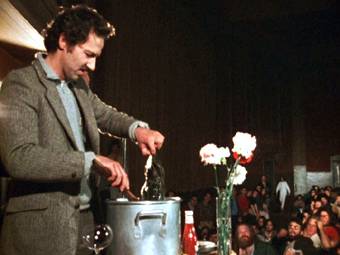More than one person confused Les Blank’s documentary “Burden of Dreams” as a film Werner Herzog actually made himself when I saw Herzog at the IU Cinema. It’s a bleak documentary about being stuck and blindly continuing in the pursuit of dreams until everything sinks into madness.
Except Herzog did make this film, only his is called “Fitzcarraldo.”
“Burden of Dreams” is the enthralling document of one of the most legendary film productions in cinema history. “Fitzcarraldo’s” only rival in this sense, and “Burden of Dreams'” only comparable rival, are “Apocalypse Now” and the documentary “Hearts of Darkness: A Filmmaker’s Apocalypse.” Yet unlike “Hearts of Darkness,” a film made years later and one that aims for the same feeling of madness as its source material, Les Blank’s film was released the same year and is a literal, fact based illustration of impossibility. Yes Herzog got his film made, and it even ends on a bittersweet, happy note, but “Burden of Dreams” treats this idea as an after thought. The struggle and the lasting impression left by surviving this ordeal is still there.
Time and again during his week in Indiana, Herzog referred to nature as a cruel, obscene place where poetry exists, but not in the Disney-fied version most people imagine. Here he says to the camera, “The trees here are in misery. The birds are in misery. They don’t sing; they just screech in pain. If there is a God, he created this place out of anger. Its only harmony is that of collective murder.”
His love-hate relationship with the jungle seems to start right here, and we have it all on tape. Wouldn’t it be funny if before this he was actually a charming, sunny guy?
Herzog himself called “Fitzcarraldo” one of the best documentaries he ever made. It’s the story of a man, Brian Sweeney Fitzgerald (Klaus Kinski), with a dream to bring opera to the South American jungle by opening his own opera house. His get rich quick scheme involves dragging a boat over a mountain to a parallel river on the opposite side, only for his plan to end in failure after successfully completing that impossible task.
Because Herzog wanted to shoot in the jungle and use a real boat, production on “Fitzcarraldo” had quite literally the same logistical problems amidst so many more. The film describes that the native American extras he paid only $3.50 a day, twice their daily rate, believed rumors that Herzog was planning on raping and murdering their entire civilization. Activists showed the natives Holocaust photos and told them Herzog was responsible for this genocide on his previous film. This coupled with a civil war in the territory he was shooting, forced Herzog to move to an even more remote location, hundreds of miles away from the nearest town.
Blank’s way of illustrating this is poignant and elegant. Rather than use a map or narration, he has Herzog standing alone in the dense jungle. He points one way and says it’s a couple hundred miles until the forest ends. He points in another direction and says the same. He turns yet another 90 degrees and says its even more. The final direction he points in is the shortest, only a hundred miles. But they are really in the middle of nowhere.
Herzog demands the most of his production in the worst conditions. He needs three boats, one to film on one river, one to drag over the mountain, and one to film on the second river, potentially destroying it on rapids. His engineers and DPs know how futile this all is, his actors Klaus Kinski feel trapped, and his extras feel their lives are in danger.
The subtlety of Blank’s film however is that Herzog is never fully portrayed as a madman. His plans seem outrageous on paper or when spoken by the narrator, but he knows his actions will be disastrous no matter what he does, so all he can do is try to lessen the blow. We’re treated to lovely Herzog quotes about preserving native American life (“I don’t want to live in a world without lions”) and of pursuing dreams (“Life is only an illusion, behind which lies the reality of dreams.”), and although we question the brutal nature of filmmaking, only Herzog seems capable of rationalizing its artistic merits.
Blank creates feelings of dread and fleeting optimism through the smallest of details. We see Herzog wading in knee deep mud, and we know he’s literally and figuratively in deep. The news that people don’t even have a soccer ball seems even worse that their lives are in danger. But at least he can get prostitutes on his set or can find a way to keep the beer cold.
The Criterion Collection DVD of “Burden of Dreams” is also paired with another Les Blank documentary short about Herzog, the hilarious “Werner Herzog Eats His Shoe,” a documentary about how Herzog stood in front of an audience, cooked and ate parts of his shoe after losing a bet to Errol Morris that he would never make his film “Gates of Heaven.” This film is a terrific little gem of directorial history, one that encourages people to find the motivation and guts to make movies, even if it means making a clown of yourself for your art.
“We should be foolish enough to do things like that,” Herzog says. He also says soundbytes like “I’m quite convinced cooking is the only alternative to filmmaking,” “A grown man like me should not go a week without cooking a meal,” and “We forgot the salt!”
